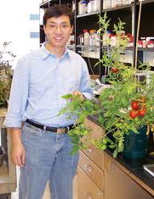NSF Award Advances Crop Disease Research
Dr. Lirong Zeng, an assistant professor of biology in UALR’s College of Science and Mathematics, has recently been awarded a $423,783 grant from the National Science Foundation to support his work investigating ubiquitination, a process that plays a role in plant immunity. Understanding the molecular mechanisms by which plants achieve immunity against pathogen attack has been a topic of interest among the plant scientific research community in recent years. The grant will support Zeng’s research into the role of a non-classical type of ubiquitination that plays in self-protection of plants from attacks by bacterial pathogens. Ubiquitination is a highly conserved protein modification process that is found in all organisms consisting of structurally more sophisticated cells, such as plants, animals, and humans.
Plants, like animals and humans, are often under the risk of being attacked by many different pathogens. In many cases, such attack will result in disease.
“In recent years, ubiquitination has emerged as a key regulatory mechanism of plant immunity against many pathogens,” Zeng said.
Opening a new perspective on plant immunity, Zeng and his team are finding evidence of how tomato plants are protected against bacterial pathogens by activities of enzymes related to ubiquitination.
“This work will also assist in efforts to unravel biological processes and proteins that are controlled by non-classical ubiquitination, knowledge of which is very limited at present,” the professor said.
“Receiving this NSF award is a clear indication of competitiveness for Dr. Zeng’s research, and I predict he will land more awards in the years to come,” said Dr. Michael Gealt, professor of biology and dean of the College of Science and Mathematics.
Zeng’s research focuses on the identification and characterization of genes and signal transduction pathways involved in tomato and rice immunity, particularly the roles and molecular mechanism by which the ubiquitination system regulates defense responses in these plants.
The long-term goal of Zeng’s research is to gain in-depth understanding of how plants and pathogens interact at the molecular level and use the knowledge to create plants and crops with increased and durable resistance to diseases.
“This NSF award received by Dr. Zeng is a significant achievement and certainly will add to the strength of research in the department of biology at UALR,” said Dr. John Bush, chair of the department.
Zeng earned his doctorate in molecular plant pathology from Ohio State University. He did post-doctorate research at the Boyce Thompson Institute for Plant Research at Cornell University. For eight years, his research has focused on the molecular biology and biochemistry of plant-microbe interactions, including exploring and defining the molecular basis underlying plant resistance and susceptibility against bacterial and fungal pathogens.
Findings from his research will eventually lead to crop improvement and less pesticide usage, which is an important component of sustainable agricultural practice aimed at less energy-intensive production of food, fiber, and biofuels.
The grant will support Zeng’s research into the role of a non-classical type of ubiquitination that plays in self-protection of plants from attacks by bacterial pathogens. Ubiquitination is a highly conserved protein modification process that is found in all organisms consisting of structurally more sophisticated cells, such as plants, animals, and humans.
Plants, like animals and humans, are often under the risk of being attacked by many different pathogens. In many cases, such attack will result in disease.
“In recent years, ubiquitination has emerged as a key regulatory mechanism of plant immunity against many pathogens,” Zeng said.
Opening a new perspective on plant immunity, Zeng and his team are finding evidence of how tomato plants are protected against bacterial pathogens by activities of enzymes related to ubiquitination.
“This work will also assist in efforts to unravel biological processes and proteins that are controlled by non-classical ubiquitination, knowledge of which is very limited at present,” the professor said.
“Receiving this NSF award is a clear indication of competitiveness for Dr. Zeng’s research, and I predict he will land more awards in the years to come,” said Dr. Michael Gealt, professor of biology and dean of the College of Science and Mathematics.
Zeng’s research focuses on the identification and characterization of genes and signal transduction pathways involved in tomato and rice immunity, particularly the roles and molecular mechanism by which the ubiquitination system regulates defense responses in these plants.
The long-term goal of Zeng’s research is to gain in-depth understanding of how plants and pathogens interact at the molecular level and use the knowledge to create plants and crops with increased and durable resistance to diseases.
“This NSF award received by Dr. Zeng is a significant achievement and certainly will add to the strength of research in the department of biology at UALR,” said Dr. John Bush, chair of the department.
Zeng earned his doctorate in molecular plant pathology from Ohio State University. He did post-doctorate research at the Boyce Thompson Institute for Plant Research at Cornell University. For eight years, his research has focused on the molecular biology and biochemistry of plant-microbe interactions, including exploring and defining the molecular basis underlying plant resistance and susceptibility against bacterial and fungal pathogens.
Findings from his research will eventually lead to crop improvement and less pesticide usage, which is an important component of sustainable agricultural practice aimed at less energy-intensive production of food, fiber, and biofuels.
View more stories in News
